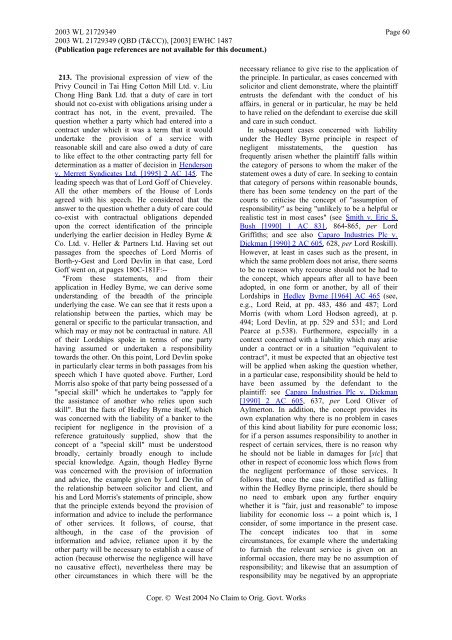Tesco v Constain - Thomson Reuters
Tesco v Constain - Thomson Reuters
Tesco v Constain - Thomson Reuters
Create successful ePaper yourself
Turn your PDF publications into a flip-book with our unique Google optimized e-Paper software.
2003 WL 21729349 Page 602003 WL 21729349 (QBD (T&CC)), [2003] EWHC 1487(Publication page references are not available for this document.)213. The provisional expression of view of thePrivy Council in Tai Hing Cotton Mill Ltd. v. LiuChong Hing Bank Ltd. that a duty of care in tortshould not co-exist with obligations arising under acontract has not, in the event, prevailed. Thequestion whether a party which had entered into acontract under which it was a term that it wouldundertake the provision of a service withreasonable skill and care also owed a duty of careto like effect to the other contracting party fell fordetermination as a matter of decision in Hendersonv. Merrett Syndicates Ltd. [1995] 2 AC 145. Theleading speech was that of Lord Goff of Chieveley.All the other members of the House of Lordsagreed with his speech. He considered that theanswer to the question whether a duty of care couldco-exist with contractual obligations dependedupon the correct identification of the principleunderlying the earlier decision in Hedley Byrne &Co. Ltd. v. Heller & Partners Ltd. Having set outpassages from the speeches of Lord Morris ofBorth-y-Gest and Lord Devlin in that case, LordGoff went on, at pages 180C-181F:--"From these statements, and from theirapplication in Hedley Byrne, we can derive someunderstanding of the breadth of the principleunderlying the case. We can see that it rests upon arelationship between the parties, which may begeneral or specific to the particular transaction, andwhich may or may not be contractual in nature. Allof their Lordships spoke in terms of one partyhaving assumed or undertaken a responsibilitytowards the other. On this point, Lord Devlin spokein particularly clear terms in both passages from hisspeech which I have quoted above. Further, LordMorris also spoke of that party being possessed of a"special skill" which he undertakes to "apply forthe assistance of another who relies upon suchskill". But the facts of Hedley Byrne itself, whichwas concerned with the liability of a banker to therecipient for negligence in the provision of areference gratuitously supplied, show that theconcept of a "special skill" must be understoodbroadly, certainly broadly enough to includespecial knowledge. Again, though Hedley Byrnewas concerned with the provision of informationand advice, the example given by Lord Devlin ofthe relationship between solicitor and client, andhis and Lord Morris's statements of principle, showthat the principle extends beyond the provision ofinformation and advice to include the performanceof other services. It follows, of course, thatalthough, in the case of the provision ofinformation and advice, reliance upon it by theother party will be necessary to establish a cause ofaction (because otherwise the negligence will haveno causative effect), nevertheless there may beother circumstances in which there will be thenecessary reliance to give rise to the application ofthe principle. In particular, as cases concerned withsolicitor and client demonstrate, where the plaintiffentrusts the defendant with the conduct of hisaffairs, in general or in particular, he may be heldto have relied on the defendant to exercise due skilland care in such conduct.In subsequent cases concerned with liabilityunder the Hedley Byrne principle in respect ofnegligent misstatements, the question hasfrequently arisen whether the plaintiff falls withinthe category of persons to whom the maker of thestatement owes a duty of care. In seeking to containthat category of persons within reasonable bounds,there has been some tendency on the part of thecourts to criticise the concept of "assumption ofresponsibility" as being "unlikely to be a helpful orrealistic test in most cases" (see HSmith v. Eric S.Bush [1990] 1 AC 831, 864-865, per LordGriffiths; and see also HCaparo Industries Plc v.Dickman [1990] 2 AC 605, 628, per Lord Roskill).However, at least in cases such as the present, inwhich the same problem does not arise, there seemsto be no reason why recourse should not be had tothe concept, which appears after all to have beenadopted, in one form or another, by all of theirLordships in Hedley HByrne [1964] AC 465 (see,e.g., Lord Reid, at pp. 483, 486 and 487; LordMorris (with whom Lord Hodson agreed), at p.494; Lord Devlin, at pp. 529 and 531; and LordPearce at p.538). Furthermore, especially in acontext concerned with a liability which may ariseunder a contract or in a situation "equivalent tocontract", it must be expected that an objective testwill be applied when asking the question whether,in a particular case, responsibility should be held tohave been assumed by the defendant to theplaintiff: see HCaparo Industries Plc v. Dickman[1990] 2 AC 605, 637, per Lord Oliver ofAylmerton. In addition, the concept provides itsown explanation why there is no problem in casesof this kind about liability for pure economic loss;for if a person assumes responsibility to another inrespect of certain services, there is no reason whyhe should not be liable in damages for [sic] thatother in respect of economic loss which flows fromthe negligent performance of those services. Itfollows that, once the case is identified as fallingwithin the Hedley Byrne principle, there should beno need to embark upon any further enquirywhether it is "fair, just and reasonable" to imposeliability for economic loss -- a point which is, Iconsider, of some importance in the present case.The concept indicates too that in somecircumstances, for example where the undertakingto furnish the relevant service is given on aninformal occasion, there may be no assumption ofresponsibility; and likewise that an assumption ofresponsibility may be negatived by an appropriateCopr. © West 2004 No Claim to Orig. Govt. Works
















